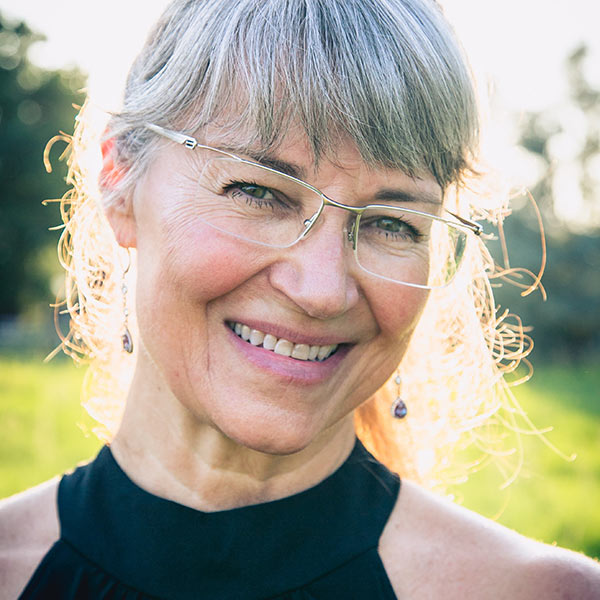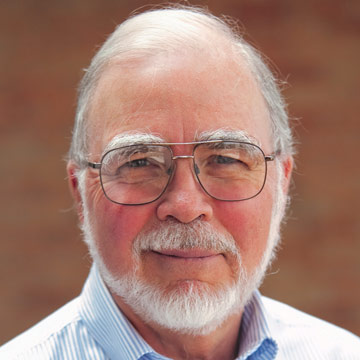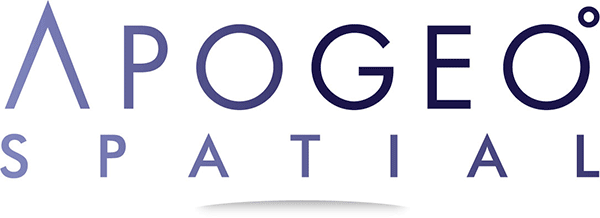The Apogeo Spatial mission is to communicate the power of geospatial tools and technologies in managing the world’s scarce resources and environment, so that the global population has security—of water, food and energy.
Apogeo focuses on long-term sustainability and security of the planet and people. We provide visual intelligence elevating global awareness. Business, government and academic professionals find the information—and inspiration—for using geospatial tools to build a more sustainable world. With the fresh, relevant insights from expert contributors, stunning visuals and clear examples of the technologies, those who make critical policy and business decisions about the world’s resources will understand the power of remotely sensed data.
Apogeo Spatial is the new name of what was Imaging Notes magazine for more than two decades.
Our Team

Myrna James
Publisher/Managing Editor
As publisher of Apogeo Spatial magazine, Myrna has gained a unique macro view of the satellite and space industry.
READ MOREMyrna James
As publisher of Apogeo Spatial magazine, Myrna has gained a unique macro view of the satellite and space industry. She understands the space ecosystem, which is essential in understanding the value proposition and uniqueness of each company. She edits and publishes in-depth articles and long-form journalism regarding applications of remotely sensed data, from Earth observations to weather data and satellite communications.
To date, she has led and published 90+ issues of the magazines.
Myrna has served on the organizing committee for conferences including Where 2.0 held in San Jose, California; and the International Society for Digital Earth (ISDE5) held in Berkeley, California. In addition to handling press and media for the conferences, she also handled press for Amnesty International when they launched their new live website to track human rights abuses in Sudan, “Eyes on Darfur.” It was the first website utilizing satellite imagery in real time to monitor human rights abuses.
In 2017, she founded a marketing and communications firm in the space, satellite, data and technology sectors, for both NewSpace and traditional companies. The team re-named and branded a new company doing quantum communications in space, with the first commercial quantum satellite on orbit from any country outside of China.
In 2009, she co-founded LBx Journal, about how location is used in businesses, LB = “Location-based”, the x being the algebraic variable representing all the ways in which location is used in business – supply chain, targeted marketing, production, distribution, etc. It was about “location in the language of business,” and was published for about five years.
She founded Blueline Publishing in 2003 to publish books and media with positive messages. In addition to the magazines, she has published nine books, including two nonfiction books about Operation Babylift, which occurred at the end of the Vietnam War as “Saigon was falling” in 1975. The operation authorized the U.S. Air Force to fly out for as long as they could about 3,300 orphans in a three-week period, saving their lives, until the epic final rescue of people from the rooftop of the U.S. embassy occurred, as depicted in the musical, Miss Saigon. This true humanitarian mission and story is incredibly profound, and most people are unaware of it.
Among Myrna’s defining experiences are traveling the world solo for 18 months, when she lived in treehouses in Turkey, trekked in the monsoon with leeches in Nepal, cooked on a cattle station in outback Australia, debated politics with a Frenchman of her father’s generation, and happened to be in Paris when France won the World Cup in 1998 and celebrated along the Champs-Élysées with dear friends, not as a tourist.
She had one of the first “live” travel websites and was blogging before blogging was a word. For this reason, she was contacted by The New York Times to feature her website in the Travel Section. Her trip permanently broadened her worldview, and she sees that all of humanity has more in common than not. This experience has created an intense interest in “The Overview Effect,” which is the change in perception experienced by astronauts when they go into space, and look back at Earth. With no national boundaries on the planet, a sense of oneness and unity prevails. This concept is now infused into all of Myrna’s work.
Her prior career includes handling national advertising for global publishers Time Warner (Parenting) and Gannett (USA Weekend), when she lived in Chicago’s Lincoln Park neighborhood where she played beach volleyball and went to street fairs on most weekends. She handled high-profile accounts like Procter & Gamble, Sony Handycam, Nikon, and Frito Lay, including the launch of Baked Lays on Super Bowl weekend in 1997.
Prior to that, she was an Admissions Representative for Kansas State University, where she graduated from the Arts & Sciences Honors Program with a degree in English and minors in Sociology and Women’s Studies.
She recently co-founded a space called The 3rd Place Pop-Up in Denver, offering co-working, event space, and pop-up space for start-ups. The space is for entrepreneurs to collaborate and experiment in a place where they want to be: Their own “3rd Place.” The space was closed in Summer 2020 due to the government reactions to covid.

Ray A. Williamson, PhD
Editor
Apogeo Spatial Editor Ray A. Williamson is a resident of Cortez, Colorado. In his professional career, he has served on the faculty of the University of Hawaii; St. John’s College, Annapolis, Maryland; The George Washington University School of International Affairs; and the International Space University.
READ MORERay A. Williamson, PhD
Apogeo Spatial Editor Ray A. Williamson is a resident of Cortez, Colorado. In his professional career, he has served on the faculty of the University of Hawaii; St. John’s College, Annapolis, Maryland; The George Washington University School of International Affairs; and the International Space University. He also served as Senior Associate of the U.S. Congress Office of Technology Assessment (OTA) where he focused on the technologies and policies of U.S. and international space activities. He is retired from Secure World Foundation, (SWF), based in Broomfield, CO, where from 2007 to 2011, he was the first Executive Director. SWF is a non-governmental organization devoted to promoting the long-term sustainability of space activities and the use of space technologies for the benefit of humanity.
Ray has published 10 edited volumes and numerous articles focused on space policy, space technologies and international relations. Additionally, while at OTA, he guided the research and publication of some 20 major reports on U.S. space policy and technology.
Ray has also had a long-term interest in the astronomical knowledge and practices of the Southwest Indian tribes and how they integrate astronomy into their art, traditions, and daily lives. In addition to his extensive publications on the technologies and policies of the world’s space programs, he has published numerous articles on the astronomy and ritual of the prehistoric Pueblo Indians and on the use of advanced technologies for historical preservation, research, and education. He has written or edited several books on Native American traditions, Southwest history, and archaeology, among them, Living the Sky: The Cosmos of the American Indian, They Dance in the Sky and First Houses (with Jean G. Monroe) and, with Fred Blackburn, Cowboys and Cave Dwellers: Basketmaker Archaeology in Utah’s Grand Gulch.
Ray holds a B.A. in physics from the Johns Hopkins University and his Ph.D. in astronomy from the University of Maryland. He is married to attorney and ESOL instructor, Carol Carnett.

Dylan Taylor
Columnist
Chairman & CEO, Voyager Space Holdings
Founder & Chairman of Space for Humanity
Dylan Taylor is a global business leader and philanthropist. He is an active pioneer in the space exploration industry as a CEO, investor, thought leader and futurist.
READ MOREDylan Taylor
Chairman & CEO, Voyager Space Holdings
Founder & Chairman of Space for Humanity
Dylan Taylor is a global business leader and philanthropist. He is an active pioneer in the space exploration industry as a CEO, investor, thought leader and futurist. Early in his career, Dylan was a pioneer in the electronics industry. Later, he excelled as a Fortune 1000 executive and board member in several multi-national service firms with CEO level responsibility exceeding $3B dollars and leading teams with over 16,000 employees.
Dylan has been cited by Harvard University, Space News, the BBC, Pitchbook, CNBC and others as having played a seminal role in the growth of the private space industry. As an early-stage investor in more than 50 emerging ventures, including Accion, Kepler, York, Vector Space, Astrobotic, Made in Space, Relativity, and Planet, Dylan is widely considered the most active private space investor in the world. Currently, Dylan serves as Chairman & CEO of Voyager Space Holdings, a multi-national space holding firm that acquires and integrates leading space exploration enterprises globally.
Dylan’s technical background, global business experience and unbridled passion for space make him a unique figure within his industry. He regularly speaks and writes about the future of the space economy and is sought after by the media for his expertise in the financial aspects of space investing as well as industry dynamics. As a writer and columnist, he has written several widely read pieces on the future of the space industry for Space News, ROOM and Apogeo Spatial. As a speaker, Dylan has keynoted many of the major space conferences and has appeared regularly on both Bloomberg and CNBC.
Dylan is a leading advocate of space manufacturing and the utilization of in-space resources to further space exploration and settlement. In 2017 he became the first private citizen to manufacturer an item in space when the gravity meter he co-designed and commissioned was 3D printed on the International Space Station. The historic item is now housed in the Museum of Science and Industry in Chicago.
Dylan has also had an extensive philanthropic impact on the space industry. In 2017, Dylan founded the nonprofit, Space for Humanity, which seeks to democratize space exploration and develop solutions to global issues through the scope of human awareness to help solve the world’s most intractable problems. Additionally, Dylan is the Co-Founding Patron of the Commercial Spaceflight Federation, which seeks to promote the growth of commercial space activity. Dylan serves as a strategic advisor for both the Archmission and the Human Spaceflight Program. Dylan is also the founder of the popular space philosophy website 2211.world as well as the Ad Astra Dinners, a Jeffersonian styled dinner series featuring some of the world’s leading influencers discussing the future of humanity in space.
For his influence as a global leader and his commitment to creating a positive impact on the world, Dylan has been honored with numerous personal and professional accolades in recent years. The World Economic Forum recognized Dylan as a Young Global Leader in 2011 and he was named a Henry Crown Fellow of the Aspen Institute in 2014. In 2013, Dylan Taylor was awarded Mid-market awards ‘Mid-Market Rising Star of the Year.’ Dylan is also a Delphi Fellow for Big Think, a digital knowledge forum that brings together top thinkers from around the

Hans-Peter Plag, PhD
Columnist
Director & Founder of the Mitigation & Adaptation Research Institute
Old Dominion University
After some years as a carpenter, Hans-Peter Plag studied mathematics and geophysics in Berlin and obtained his PhD in Natural Sciences in 1988 from the Free University of Berlin. From 1988 to 1997 he was head of a research group in geodynamics at the University of Kiel, Germany. During that time, he was also active in environmental movements and later was a member of the Green Party.
READ MOREHans-Peter Plag, PhD
Director & Founder of the Mitigation & Adaptation Research Institute
Old Dominion University
After some years as a carpenter, Hans-Peter Plag studied mathematics and geophysics in Berlin and obtained his PhD in Natural Sciences in 1988 from the Free University of Berlin. From 1988 to 1997 he was head of a research group in geodynamics at the University of Kiel, Germany. During that time, he was also active in environmental movements and later was a member of the Green Party.
Among others, he was the lead author of a concept for waste reduction and recycling, which contributed to a significant reduction in waste and an increase in recycling. In his teaching, he introduced the students to the concept of sustainability and challenged them with the question of how Earth sciences can contribute to a successful quest for sustainable development. In 1995, he worked for five months at the Proudman Oceanographic Laboratory, Bidston, United Kingdom. From 1997 to 2004 he was the head of the department “Global Reference” at the Geodetic Institute of the Norwegian Mapping Authority in Norway, where he also was professor (mathematical models in geodesy) at the University of Oslo.
From 2004 to 2012, he was a research professor at the University of Nevada, Reno, and affiliated with the Nevada Geodetic Laboratory and the Nevada Seismological Laboratory. From 2010 to 2016, he was a Visiting Professor at the Stevens Institute of Technology, Hoboken, New Jersey. From 2012 to 2013, he held the Chair on Global Change and Sustainability and was the Director of the Global Change and Sustainability Research Institute (GCSRI), University of the Witwatersrand, Johannesburg, South Africa.
In June 2013, he joined Old Dominion University (ODU) as the Co-Director of the Climate Change and Sea Level Rise Initiative and Professor in the Department of Ocean, Earth and Atmospheric Science. Since March 2014, he is the founding Director of the Mitigation and Adaptation Research Institute (MARI) at ODU.
His main fields of expertise are in sustainability, global and climate change, local to global sea-level changes, Earth system dynamics, solid Earth geophysics, the rheology of the Earth’s mantle and continuum mechanics, deformation of the solid Earth, space geodesy and geodetic reference frames. He has provided scientific advice to private companies and governmental committees, particularly with respect to future sea-level rise. Between 1990 and 2010, he was engaged in utilizing space-geodetic observations for Earth system research, and he was vice-president of the Global Geodetic Observing System (GGOS) from 2003 to 2008.
Current main professional activities are related to the Group on Earth Observations (GEO), which is implementing the Global Earth Observation System of Systems (GEOSS). He engages in assessments of global catastrophic and Anthropocene risks, including those related to plastics, land use, extinction, and modern climate change and sea-level rise. His educational efforts focus on sustainability leadership, and he has been leading the development of an undergraduate and graduate program utilizing case studies in sustainability to create a real-world learning experience for students.
He is on the Board of iCREST education initiative of the ICES Foundation. In his career, he has led more than fifteen large international projects, chaired international programs and committees, organized numerous international workshops and conferences, often as chair of the program and/or organizing committees, edited many special issues and proceedings, and coordinated and edited two international and interdisciplinary community reports with up to 40 participating authors.
Since 1994, he is a member of the Editorial Board of the Journal of Geodynamics and since 1996 Editor-in-Chief for geodesy for Physics and Chemistry of the Earth. Since 2013, he has authored the column “On the Edge” in Apogeo Spatial, where he comments, among others, on issues of global change, unsustainability, and global risk governance.

Leonard David
Contributing Writer
Leonard David is a space journalist, reporting on space activities for over 50 years. He is author of the new book, Moon Rush: The New Space Race, published by National Geographic in May 2019. Mr. David is also author of Mars – Our Future on the Red Planet published by National Geographic in October 2016.
READ MORELeonard David
Inside Outer Space (www.leonarddavid.com)
Leonard David is a space journalist, reporting on space activities for over 50 years. He is author of the new book, Moon Rush: The New Space Race, published by National Geographic in May 2019.
Mr. David is also author of Mars – Our Future on the Red Planet published by National Geographic in October 2016. The book is the companion volume to Mars – a National Geographic Channel television series in its second season from executive producers Brian Grazer and Ron Howard.
Leonard is co-author with Apollo 11’s Buzz Aldrin of Mission to Mars – My Vision for Space Exploration released in May 2013 and published by the National Geographic Society. A soft cover edition of the book with a new essay was released in May 2015.
Also issued in May 2015 was Space Careers, co-authored by Leonard and entrepreneur Scott Sacknoff. This book is designed for high school, college, graduate students – and job seekers of all ages. It is an in-depth resource for understanding and finding a career in the space and satellite industry.
Leonard is the first recipient of the American Astronautical Society’s (AAS) “Ordway Award for Sustained Excellence in Spaceflight History” in the category of journalism, presented in October 2015 in connection with the 8th AAS Wernher von Braun Memorial Symposium held in Huntsville, Alabama.
Mr. David is the 2010 winner of the prestigious National Space Club Press Award, presented this honor during the Club’s annual Robert H. Goddard Memorial Dinner in April 2011 that was held in Washington, D.C.
Leonard is SPACE.com’s Space Insider Columnist, as well as a correspondent for Space News magazine and a contributing writer for several publications, specifically Scientific American, and other venues, such as Aerospace America, the membership publication of the American Institute of Aeronautics and Astronautics (AIAA).
Leonard David has been reporting on space exploration for over five decades. Throughout those years, his writings have appeared in numerous websites, newspapers, magazines and books, such as the Financial Times, Foreign Policy, Private Air, Sky and Telescope, Astronomy, SPACE.com and Space News, as well as Aerospace America and in supplemental writing for Aviation Week & Space Technology magazine. Mr. David has been a consultant to NASA, other government agencies and the aerospace industry.
In the mid-1980’s he served as Director of Research for the National Commission on Space, a U.S. Congress/White House study that appraised the next 50 to 100 years of space exploration.
Leonard is co-author of Extreme Flight: Rocket Science, Sundance/Newbridge Educational Publishing issued in 2006. As a Contributing Essayist, Mr. David’s writings can be found in the National Geographic`s Encyclopedia of Space, published in 2004.
Leonard is also a co-author of the book Chaos to Cosmos – A Space Odyssey, published by the Denver Museum of Nature & Space in 2003. In past years, Mr. David has served as editor-in-chief of the National Space Society`s Ad Astra and Space World magazines, as well as the newsstand publication, Final Frontier.
For NASA, Leonard completed the task of writing a majority of the highly regarded Spinoff 1997, Spinoff 1998, and Spinoff 1999 publications. In the past, Leonard has assisted the audio/visual branch by interviewing and writing scripts for the monthly NASA radio program, “The Space Story.” He has worked with the NASA exhibits branch on public outreach displays, writing text and carrying out photo research on both the commercial uses of space and infrared technologies for astronomy, Earth remote sensing and spinoff applications.
Leonard served as research and technical advisor for the PBS-televised, Living and Working in Space – The Countdown Has Begun, an hour-long science fact/fiction look at careers in space that was premiered on PBS on March 31, 1993.
Leonard was contracted by the producers of the video, the Foundation for Advancements in Science and Education (FASE), to work on the project through 1992 into early 1993. Mr. David served as a technical consultant to the widely acclaimed Bouncing to Mars: The Inside Story of the Mars Exploration Rover Missions, produced by Passport to Knowledge, made possible, in part, by the National Science Foundation and was released in summer 2003.
Mr. David was honored to receive the internationally recognized Royal Aeronautical Society Award for Best Space Submission at the Aerospace Journalist of the Year Awards in England in 2006 and in Paris in 2003.
In 2006, Leonard received the Orbit Award for Space Media from the Space Tourism Society honoring his writings over the decades on the burgeoning space tourism industry. Later that year, he won the 2nd Annual Space Journalism award for best article on human spacefaring for January-September 2005 for his article, “Space Tourism: Keeping the Customer Satisfied”.
In 2001, Mr. David won the National Space Society’s Space Pioneer Award for Media.
Leonard David lives in Golden, Colorado with his wife Barbara where the clear, nighttime sky fuels the imagination about space travel to other worlds…as well as concern over lost luggage at Mars.
What others are saying
- It is exciting to see Apogeo Spatial and its focus on ecosystem health. Our ecological and social challenges are intertwined and global. Utilizing the view from space will assist us in addressing large-scale ecosystems health and in determining the actions that will be generative and effective in healing the planet. Apogeo Spatial is bringing critical ideas and tactics for utilizing geospatial tools to solve global issues.Anita M. BurkeFounder / The Catalyst Institute
- Apogeo is providing game-changing insights for a game-changing sector.Nancy ColletonPresident / Institute for Global Environmental Strategies Executive Director / Alliance for Earth Observations
- The Apogeo Spatial launch is very exciting for those of us working in the geospatial field. Apogeo is a leading source for understanding how global scale issues can be addressed using geospatial information and tools. It is becoming a primary means to keep up with the revolution in spatial information.Bill Gail, PhDCTO / Global Weather Corporation
- Apogeo Spatial is an important link to the education and academic communities to show young people the impact of geospatial technologies in helping to solve challenging problems facing humankind and to know more about the unknowns.Mark BrenderDirector / DigitalGlobe Foundation
